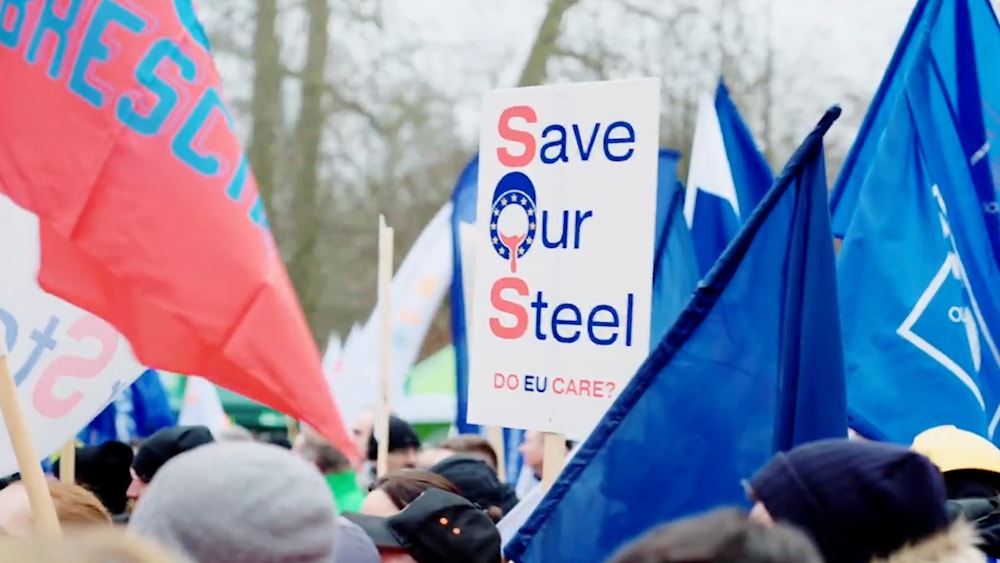EUROFER warns US tariffs endanger European steel industry, sovereignty
The EU is now expected to lose at least one million tonnes of steel exports to the US, with additional losses from new duties on steel-related products.
-

Thousands of industrial workers are calling for action. (Screengrab, X/@EUROFER_eu)
The European Steel Association (EUROFER) has voiced strong concerns over the latest tariffs imposed by the United States, arguing that they pose a significant threat to the European Union's steel sector and economic independence. The new measures, introduced by US President Donald Trump, impose a 25% duty on all steel imports starting March 12, affecting not just raw materials but also a wide array of steel-based products such as cars, household appliances, and electronic devices.
In a statement, EUROFER criticized the decision, calling it a major blow to an industry already struggling with an oversaturated market. "The imposition of a 25% blanket tariff by the United States' administration on all steel imports exacerbates an already dire market environment for the European steel industry and poses a genuine threat to its future. The sector expects the European Union to respond with an effective revision of the steel safeguard measures that will mitigate the impact of the US tariffs and ensure the longevity of the industry in the long-term," the association said.
EUROFER President Dr. Henrik Adam noted that these tariffs will have a deeper impact than those introduced in 2018, as the scope of the restrictions is broader. "President Trump's 'America First' policy threatens to be a final nail in the coffin of the European steel industry. If European steel disappears, so too does European automotive, European security and defence, energy infrastructure, transportation and others. What is at stake is European sovereignty," he stated.
The EU is now expected to lose at least one million tonnes of steel exports to the US, with additional losses from new duties on steel-related products. Meanwhile, the European market faces increasing competition from cheaper imports from Asia, North Africa, and the Middle East, raising concerns about further disruptions in the sector.
📢"A Europe without industry is weak & will not count anything at international level. [...] Steel means sovereignty [...]. Without steel, there is no defence industry, no construction, no homes, no roads. It is the economic foundation of each country." #SaveEUSteel
— European Steel (@EUROFER_eu) March 11, 2025
🧵⬇️ pic.twitter.com/qn02VhNjXI
Additionally, global steel overcapacity hit record levels in 2024 and is projected to grow further in 2025, placing the European steel sector in an even more vulnerable position. With the US market becoming less accessible, EUROFER warned about the potential redirection of 18 million tonnes of steel that had previously been exported under preferential conditions. "Eighteen million tonnes of steel were exported to the US under preferential regimes and are now at risk of deflection towards the EU market. EU steel production, which lost 9 million tonnes of capacity and 18,000 jobs in 2024 alone, is at even greater risk. There is also the prospect that yet more steel will be deflected to the EU market if additional reciprocal tariffs are imposed by the US," the statement read.
To counter the fallout, the European Commission has announced plans to impose counter-tariffs on $28 billion worth of US goods, targeting sectors such as agriculture, manufacturing, and consumer goods. European Commission President Ursula von der Leyen described the move as "strong but proportionate," noting the EU's commitment to defending its industries while remaining open to negotiations.
Read more: Lula promises retaliation against US steel tariffs
Meanwhile, other major steel-exporting nations, including Canada, have signaled plans to introduce retaliatory tariffs, further escalating the trade dispute. Canada, the largest foreign supplier of steel and aluminum to the US, has announced tariffs exceeding $20 billion in response to the American restrictions.
With the EU steel industry already weakened by high energy costs and ambitious climate policies, industry leaders are urging swift and decisive action from European policymakers. EUROFER is pushing for an urgent revision of the EU's steel safeguard measures by April 1 to mitigate the expected influx of redirected steel and ensure the long-term viability of the sector.

 4 Min Read
4 Min Read








